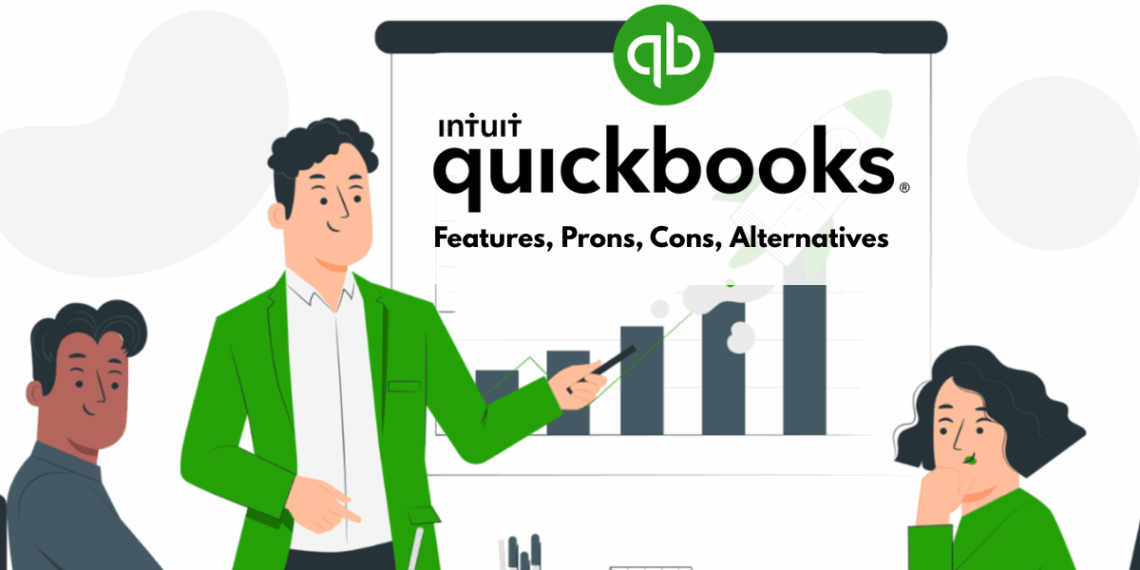For early-stage startups, establishing a solid financial foundation is not optional—it’s essential for survival and growth. 🚀 From managing your runway 📉 to impressing investors 📈, a reliable accounting system can be a game changer. QuickBooks, developed by Intuit, is one of the most trusted and widely used small business accounting tools in the world.
But is it the best fit for your startup? 🤔 In this guide, we unpack everything you need to know about QuickBooks—from pricing and features to potential pitfalls and smarter alternatives—so you can confidently choose the best financial platform for your startup’s journey. 🙌
QuickBooks Overview
QuickBooks is a cloud-based and desktop accounting software suite designed to help businesses manage their finances, from tracking income and expenses to payroll and tax compliance 💼. It is widely adopted among small and mid-sized businesses and has an especially large following among accounting professionals, making it easier for startups to find support and expert guidance 👩💼.
For startups, QuickBooks offers several strategic advantages: it scales well with your team and revenue 📈, includes a range of plan tiers that grow with you, and supports over 750 integrations that plug directly into your existing tech stack 🎯.
Whether you’re managing subscription payments, tracking project profitability, or preparing for investor due diligence, QuickBooks Online (QBO) provides accessible, real-time collaboration features and detailed financial insights right out of the box. With built-in templates, guided setup, and accountant access, it’s designed to shorten the learning curve for founders wearing multiple hats 🙋♂️.
QuickBooks Key Features
QuickBooks isn’t just about crunching numbers—it’s built to empower startups with tools that simplify financial workflows, boost visibility, and scale with your business. 🚀 Whether you’re sending your first invoice or analyzing cash flow for growth planning, these features are designed to save time, reduce errors, and give founders real financial control from day one. 📊
📊 Income & Expense Tracking
Securely connect business accounts and automatically categorize transactions to reduce manual bookkeeping.
📅 Invoicing & Payments
Create branded invoices, accept online payments, and automate reminders to get paid faster.
📰 Real-Time Reporting
Generate P&L, balance sheet, and cash flow statements. Higher tiers support custom dashboards and detailed filters.
🔎 Receipt Capture
Snap photos of receipts via mobile and auto-match them with transactions using OCR tech.
🚗 Mileage Tracking
Track business miles automatically via GPS for tax deductions—perfect for founders on the go.
🏢 Project Profitability
Monitor income, expenses, and margins for specific projects—ideal for service-based startups.
🌎 Multi-Currency Support
Handle international transactions with real-time currency conversion.
⚙️ Integrations Marketplace
Connect with 750+ tools including Stripe, Shopify, Gusto, and Salesforce.

QuickBooks Pros and Cons
👍 Pros
- Recognized industry standard
- Scalable with multiple plan tiers
- Broad feature set including inventory and project tracking
- Extensive third-party integrations
- Accountant-friendly with dedicated access
- Cloud accessibility with mobile app
👎 Cons
- High cost at advanced tiers
- Learning curve for non-accountants
- Limited features in lower-tier plans
- Customer support often criticized
- Add-ons (e.g. Payroll, Time Tracking) cost extra
- App performance can be buggy
Considering QuickBooks for Startups
Before diving in, it’s important to take a step back and assess whether QuickBooks truly fits your startup’s current and future needs. 📋 This section walks you through practical questions to evaluate compatibility, cost-effectiveness, and long-term usability—so you don’t just pick a tool, you choose a strategic partner. 🔍
📌 What’s your primary need? Are you looking for comprehensive bookkeeping, fast invoicing, accurate reporting—or all three? Identifying your core priority helps determine if QuickBooks’ base plan is enough or if you’ll need more advanced functionality.
💸 Budget-conscious? QuickBooks offers value, but premium features like payroll, inventory, and extra users come at a cost. Startups on a tight budget should consider the true total cost—not just the sticker price.
🔗 Do you need integrations? If your business depends on platforms like Shopify, Stripe, or Gusto, QuickBooks’ integration ecosystem is a huge plus. Make sure your essential tools connect smoothly before committing.
👥 Team size & skills? Will your team grow soon? If you’ll need multiple users or your team lacks accounting experience, plan for a higher tier and potentially external bookkeeping help.
📈 Scalability? Choose a plan that not only fits your current needs but also scales with your growth. Upgrading later is possible but comes with costs and potential reconfiguration work.
📑 Need niche features? Do you sell physical products or work on complex service projects? Features like inventory tracking, project profitability, and multi-currency support are only available in higher plans.

QuickBooks Plans and Pricing
QuickBooks Online offers four main plans. Each tier includes added features and user seats:
| Plan | Monthly Price | Users Included | Key Features |
|---|---|---|---|
| Simple Start | $35 | 1 | Basic accounting, invoicing, receipt capture |
| Essentials | $65 | Up to 3 | Bill pay, time tracking, multi-currency |
| Plus | $99 | Up to 5 | Inventory, project profitability, budgeting |
| Advanced | $235 | Up to 25 | Custom reporting, automation, batch processing |
✨Add-ons like Payroll, Time Tracking, and Premium Support come at an extra cost.
QuickBooks Promo Code / Startup Discount Info
While QuickBooks doesn’t have a dedicated startup program, new users can often access 20% to 50% off 🎁for the first 3–12 months depending on the promotion. Discounts are usually tied to direct purchase and not trial signups. Eligibility is generally limited to first-time users.
Comparing QuickBooks with Alternatives
| Feature | QuickBooks | FreshBooks | Xero |
|---|---|---|---|
| Free tier🆓 | No | No | No |
| Sales pipeline tools💹 | No | Yes (Basic) | No |
| Inventory management🚚 | Yes (Plus+) | No | Yes |
| Built-in time tracking⌛ | Yes (Essentials+) | Yes | Yes |
| Reporting📜 | Advanced | Moderate | Moderate |
| Starting price💵 | $35 | $19 | $13 |

FAQs
❓ Is QuickBooks easy to use for non-accountants?
It depends. The basics are approachable, but setup and customization often require outside help.
❓ Can I integrate QuickBooks with Stripe, Shopify, or Gusto?
Yes—QuickBooks Online supports 750+ integrations, but quality varies by tool.
❓ Are there hidden costs?
Many essential tools like Payroll or Time Tracking are separate paid add-ons. Total cost can exceed base price quickly.
❓ How good is their customer support?
Standard plans get limited support. 24/7 support is only available on the Advanced plan.
❓ Can I access QuickBooks from my phone?
Yes, there’s a mobile app for tracking expenses, invoices, and more—but reviews cite performance issues.
❓ Can I migrate from Self-Employed to Online?
Not directly. You have to set up a new account and transfer data manually.
Final Thoughts
QuickBooks Online offers a strong, scalable platform for startup accounting with broad functionality and deep integration support. If you’re building a company that needs clear financial insights 📊, growing team access 👥, and investor-ready reports 💼, it’s a powerful option. The platform’s widespread use by accountants 👨💼, flexible reporting capabilities 📈, and seamless cloud access ☁️ make it well-suited for fast-moving, distributed teams.
However, beware of feature gating, add-on creep, and inconsistent support ⚠️. These issues can lead to unexpected complexity or hidden costs. Additionally, the software’s learning curve may be steep for founders without accounting experience, making professional help a practical (but costly) consideration. Still, for startups aiming to scale with confidence, QuickBooks can be a dependable backbone for financial operations—just ensure it aligns with your projected needs, budget flexibility, and long-term growth plans.
🚀 Ready to scale? QuickBooks Essentials or Plus might be your launchpad.










